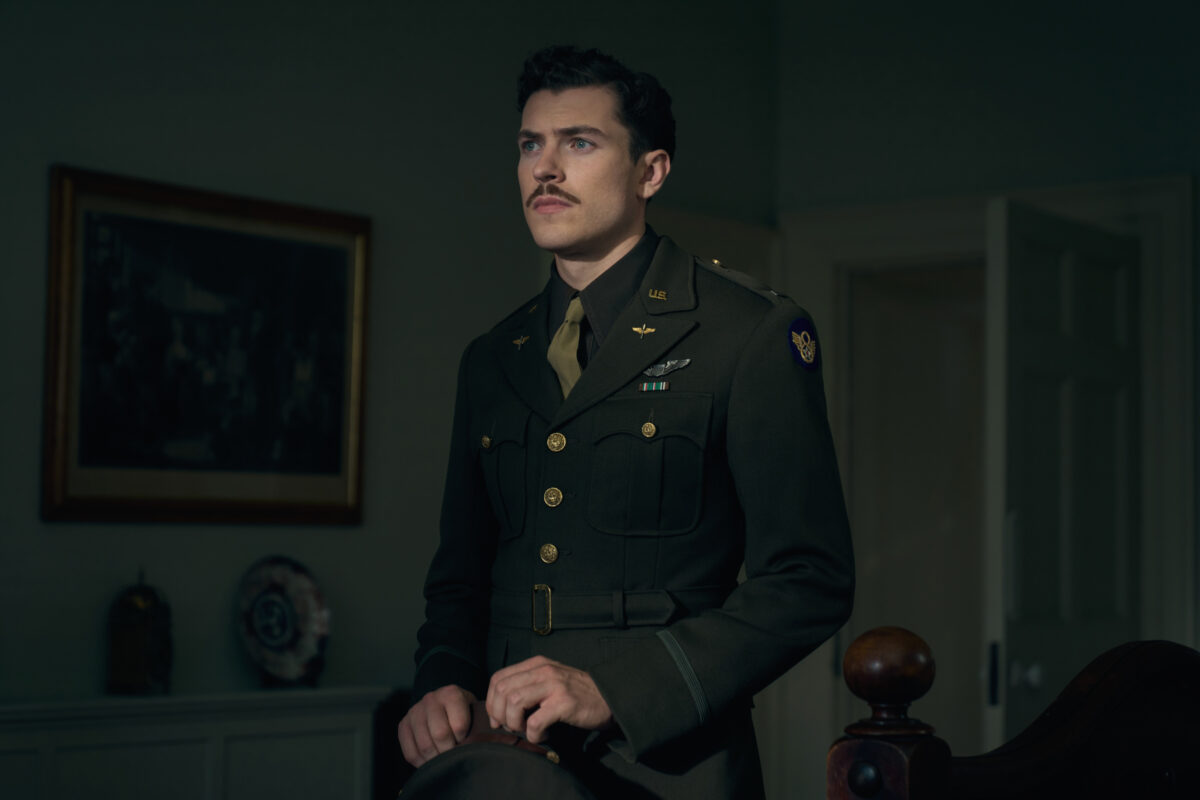In the fourth episode of “Masters of the Air,” viewers meet Robert “Rosie” Rosenthal, a pilot who joins the 100th Bombardment Group, the subject of the outstanding historical series currently airing on Apple TV+. Rosenthal is played by the very dreamy Nate Mann, who dons striking mustaches (which very few men can pull off so well), and who seems enthused, after nine months of intense training, to finally join a combat unit fighting German Nazi forces.
The show does a pretty amazing job of telling the story of Rosenthal, a true American hero, one who won countless medals for his service in the American Air Force, including two Purple Hearts, a British Flying Cross and a French Croix de Guerre. You can even hear Mann hint at the military man’s Brooklyn accent. Though his Jewish identity has only made it into the show in passing — he’s been featured in episodes four, five and six — it did greatly inform his desire to serve in World War II. He witnessed antisemitism both in his native New York, where the German American Bund held rallies in the city, and in Nazi Germany, with Kristallnacht and “Hitler’s treatment of the Jews,” which he said “affected me deeply, I had a sense of frustration.” When World War II started, that sense of frustration intensified.
We get to hear an echo of those sentiments in episode six, when we find Rosie at a rest house for soldiers after a particularly harrowing mission, dying to go back into the field. “You see people being persecuted and subjugated, you have to do something. They can’t fight for themselves,” he says.
There are also hints to Rosenthal’s family and childhood in that same episode. When asked if he plays any instruments, he tells a doctor at the rest house that “my mother and sister, Jeanette, got all the musical talent, but I know what sounds good.”
Growing up in Flatbush, Brooklyn, Rosenthal adored music and loved to sing, but he didn’t have the kind of talent that his Jewish mother and sister both had — often singing and playing the piano, especially at family gatherings. Rosenthal was kicked off the James Madison High School glee club (the same high school Ruth Bader Ginsburg and many other famous Jews attended) for his lack of musicality. While he graduated with honors, Rosenthal was not a star student at Brooklyn College, way more interested in sports as the captain of the football and baseball teams. But he did fall in love with the law while taking a constitutional law class, and ended up enrolling in law school — studying at night and working at a local law firm during the day.
Rosenthal’s family was working class; his father was a technician in the New York City Health Department. When he died in 1941, the entire family pulled together to make ends meet — Rosenthal’s sister worked as a designer; his mother took a job in the diamond trade; and Rosenthal worked all through college, never taking any time for extracurriculars. When the opportunity came to enlist after Pearl Harbor, Rosenthal took it — his sense of frustration finally disappeared, he said, because he felt like he could do something about the war and Hitler’s virulent ideology.
Rosenthal fell in love with piloting. He took to it like a duck to water. He recalled that piloting solo for the first time, he had never loved an experience more. Before joining the 100th, he did, as his character says, spend many months flying 12-hour days, an experience that prepared him well. Rosenthal called himself a “conservative pilot,” one who cared deeply for the people that he flew with, but also wasn’t too much of a show off or a risk-taker. He was informed by the kind of qualities that his Brooklyn family revered: decency, kindness and hard work.
In the fourth episode of “Masters of the Air,” Rosie asks for advice from other 100th Bomb Unit veterans, as he is a newcomer. “Try to stay alive, for at least 11 missions,” he gets told, because then he would “beat the odds.”
By the end of the war, the B-17 commander completed a total of 52 missions. Rosie had his own B-17 called “Rosie’s Riveters,” and in the end of episode six, we see him come back onto that plane, reverently touching it after it was fixed, having been badly damaged in a previous mission.
He was given the nickname Rosie because of his last name, Rosenthal, but it also reminded him of back home and his mother, Rose, as well as the music that his family loved, like the song “Rosie the Riveter,” which was particularly popular at that time.
After his service, Rosenthal went back to work at the law firm in New York. He volunteered to be a prosecutor during the Nuremberg trials, where he got the chance to bring more justice against the Nazis, and interviewed Hermann Göring. It was also there that he met his wife, Phillis. They had three children that were raised in his native New York. He passed away in 2007.
While “Masters of the Air” reverently pays tribute to a Jewish hero, listening to his own testimony about his service is incredibly moving, and definitely worth listening to if you’ve been won over by the show.








